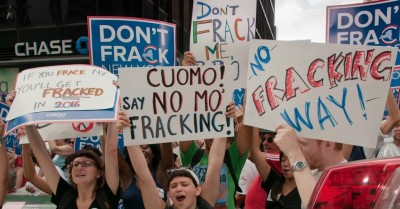Did the New York Governor’s Office Edit “Politically Inconvenient” Findings of Fracking Study?

Anti-fracking protesters outside Governor Andrew Cuomo’s policy summit in 2012. (Photo: Credo Action/cc/flickr)
Internal government documents show how state officials may have tried “to mitigate any political complication” the research may have caused for Governor Andrew Cuomo’s gas drilling policies
The administration of New York Governor Andrew Cuomo altered and delayed the findings of a key federal fracking study commissioned by the state, according to a review of internal government documents published on Monday.
An original draft of the United States Geological Survey (USGS) study, obtained and reported on by the Albany newspaper Capital, reportedly contained descriptions of environmental and health risks posed by the shale gas drilling technique. However, following “extensive” email communication between the USGS representatives, study authors and state officials—also obtained in “heavily redacted form” through a Freedom of Information Act request—those details were either “played down or removed” from the final published report.
“The messages reveal an active role by Cuomo’s Department of Environmental Conservation in shaping the text, and determining the timing of the report’s release,” writes Capital reporter Scott Waldman.
The study was commissioned in 2011 by the New York State Energy Research and Development Authority (NYSERDA), Capital notes, as a potential stepping stone to implementing a controversial plan to begin fracking on a “limited scale” in a number of Southern Tier counties, generally found west of the Catskill Mountains along Pennsylvania’s northern border. According to the state’s contract with USGS, “the objective of the proposed study is to define a pre-shale-gas-development baseline.”
Fierce community resistance has thus far delayed those plans as local groups have repeatedly called for a permanent state-wide fracking ban to replace the temporary moratorium currently in place. The controversial drilling technique has been linked to the pollution of air and groundwater, as well the increased emission of methane, found to be a major contributor to climate change.
Anti-fracking advocates across the world are mobilizing for the 2014 Global Frackdown on October 11, during which over 200 organizations will band together for an international day of protests to call for an end to fracking and a shift to a renewable energy system.
In light of his upcoming reelection bid, Cuomo has continually maintained an official “non-position” over fracking, while simultaneously cobbling together plans to build more gas infrastructure including a gas storage facility in the Finger Lakes region.
“The administration’s involvement in shaping the report seems designed, above all, to mitigate any political complication it might have caused the governor as he formulated his plan for fracking,” Waldman reports.
According to documents obtained by Capital, the draft report included a note that gas “drilling, extraction, transport via pipelines, and underground storage” could inadvertently introduce methane into drinking water supplies.
“But the version published after the copy was reviewed and edited by staff members from the state D.E.C. and New York State Energy Research and Development Authority omits the reference to pipelines and underground storage,” Waldman continues. “The later, administration-vetted version also includes a line that wasn’t in the earlier draft, saying that methane pollution risks in fracking are mitigated by well designed gas wells: ‘This risk can be reduced if the casing and cementing of wells is properly designed and constructed.'”
Further, according to Waldman’s investigation, the redacted emails also reveal that, following the study’s publication, NYSERDA officials tracked people who read the report online and then grouped them “into a few categories including Syracuse and Penn State universities, the U.S. Department of Energy, Chesapeake Energy, state government addresses and a ‘known state landowner/lease group cooperative,’ which is likely the Joint Landowners Coalition,”—a pro-drilling group.

